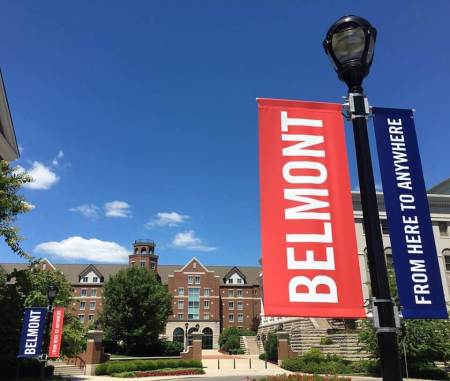Belmont U merger with art college raises concerns over Christian hiring policy

The nondenominational Belmont University in Tennessee will absorb a nearby private art college suffering from low enrollment, creating questions about whether non-Christian faculty can keep their jobs once the merger is completed in the fall.
The Nashville-based Belmont University, an institution of 8,400 students with a “rich Baptist heritage,” announced it will merge with the Watkins College of Art, a four-year art and design institution founded in 1885 that has less than 200 undergraduate students.
According to a statement released by Belmont last week, the governing boards of both institutions approved a merger agreement that is now pending approval by the accrediting agency for both schools, the Southern Association of Colleges and Schools.
The transition for Watkins’ students, programs and staff to their new home on the Belmont campus will take place by the fall 2020 semester. The two campuses are about 6.5 miles apart.
“For well over a century, Watkins has fostered the talents and honed the crafts of thousands of phenomenal artists,” Belmont President Bob Fisher said in a statement. “Partnering this legacy with Belmont’s thriving creative community in the arts, music, film and design represents a natural fit and brings incredible synergy to benefit all students.”
Watkins and Belmont are already engaged in an academic partnership in which students at both institutions are eligible to take select classes at the other institution.
But now under the agreement, Belmont will house Watkins’ undergraduate programs.
Watkins students majoring in fine arts, graphic design, illustration and photography will now join Belmont’s fine arts programs under the newly created Watkins College of Art.
Watkins students majoring in interior design will now become part of Belmont’s O’More College of Architecture and Design. Watkins’ film students will join Belmont’s Curb College of Entertainment and Music Business.
The agreement calls for the 13-acre campus where Watkins College of Art is located to be sold. The proceeds from the sale will be used to create an endowment to support scholarships for Watkins students, according to the press release.
“This is a historic day for Watkins as we join Belmont University,” Watkins College President J. Kline said in a statement. “This agreement secures the legacy and mission of Watkins for generations to come. Our two universities share many of the same ideals, including a strong commitment to our students to prepare and inspire them to become meaningful change agents in our culture and across the globe.”
The merger comes after Belmont acquired the O’More College of Design based in Franklin in 2018.
Many Watkins students and alumni have voiced their opposition to the merger. Over 3,700 people have supported an online petition asking for more transparency surrounding the merger.
“The minimal communication of the merger has left [Watkins] alumni, like myself, concerned for the future welfare of Watkins College of Art at Belmont students, faculty and staff,” the petition reads. “The sale of 2298 Rosa Parks Blvd is fraught with suspicion.”
Watkins students and staff spoke with Belmont Provost Thomas Burns during a town hall last Wednesday. They had questions related to faculty job security and the treatment of LGBT people on campus.
According to The Nashville Scene, Belmont staff assured people that the institution does not discriminate based on sexual orientation and that “everybody” is welcome at Belmont.
“We do have trans students on campus who live in residence halls and are well-served,” Burns was quoted as saying. “So it doesn’t matter to Belmont what sexual orientation, what gender identity you have, we will support you and love you and serve you, and you are welcome.”
Belmont was featured in national headlines in 2010 when it was accused of forcing out a lesbian soccer coach who announced to her team that she was having a baby with her partner. However, the school maintains that the coach’s departure was a “mutual agreement.”
A question was also raised by Watkins students about whether they’ll be required to take two religious courses as part of the general education requirements at Belmont. Burns explained that requirement will depend on how much earned credit hours students have when the merger is complete.
“We are a Christian institution,” Burns was quoted as saying. “We are not about indoctrination. We are not there to convert you. We are Christian. All of our faculty and staff are Christian. So we practice Christian hospitality. We love everybody. We serve everybody regardless of their beliefs.”
Burns stated that the religion classes are “not about indoctrination.”
“They’re about the academic study of religion. I don’t want you to come in and say, ‘I have to take first-year religion, they’re going to try to convert me to be a Christian,’” he added. “That might be the outcome. I don’t know. Maybe that’s happened, but it is not the intent.”
Burns was also pressed on whether non-Christian faculty currently employed by Watkins will be hired by Belmont. He stated: “we do not hire people who are not Christian.”
“So the ones who are not Christian will not be eligible to work at Belmont,” Burns told the town hall. “That’s just part of who we are.”
Burns did not know whether Watkins faculty will receive a severance package.
On Saturday, Watkins President Kline clarified Burns’ remarks and assured that non-Christian Watkins staff will be considered for employment at Belmont.
“Because we recognize current Watkins employees could not control nor anticipate merging with a faith-based institution, it has been determined that special consideration will be given to current Watkins employees regardless of their position of faith,” Kline wrote in an email sent to Watkins employees, according to The New York Times.
Kline added that the merger was the best option to ensure the future viability of Watkins College of Art. In his email, Kline explained that a lack of an endowment and low enrollment numbers meant that the future of Watkins is “unsustainable.”
Follow Samuel Smith on Twitter: @IamSamSmith
or Facebook: SamuelSmithCP





















